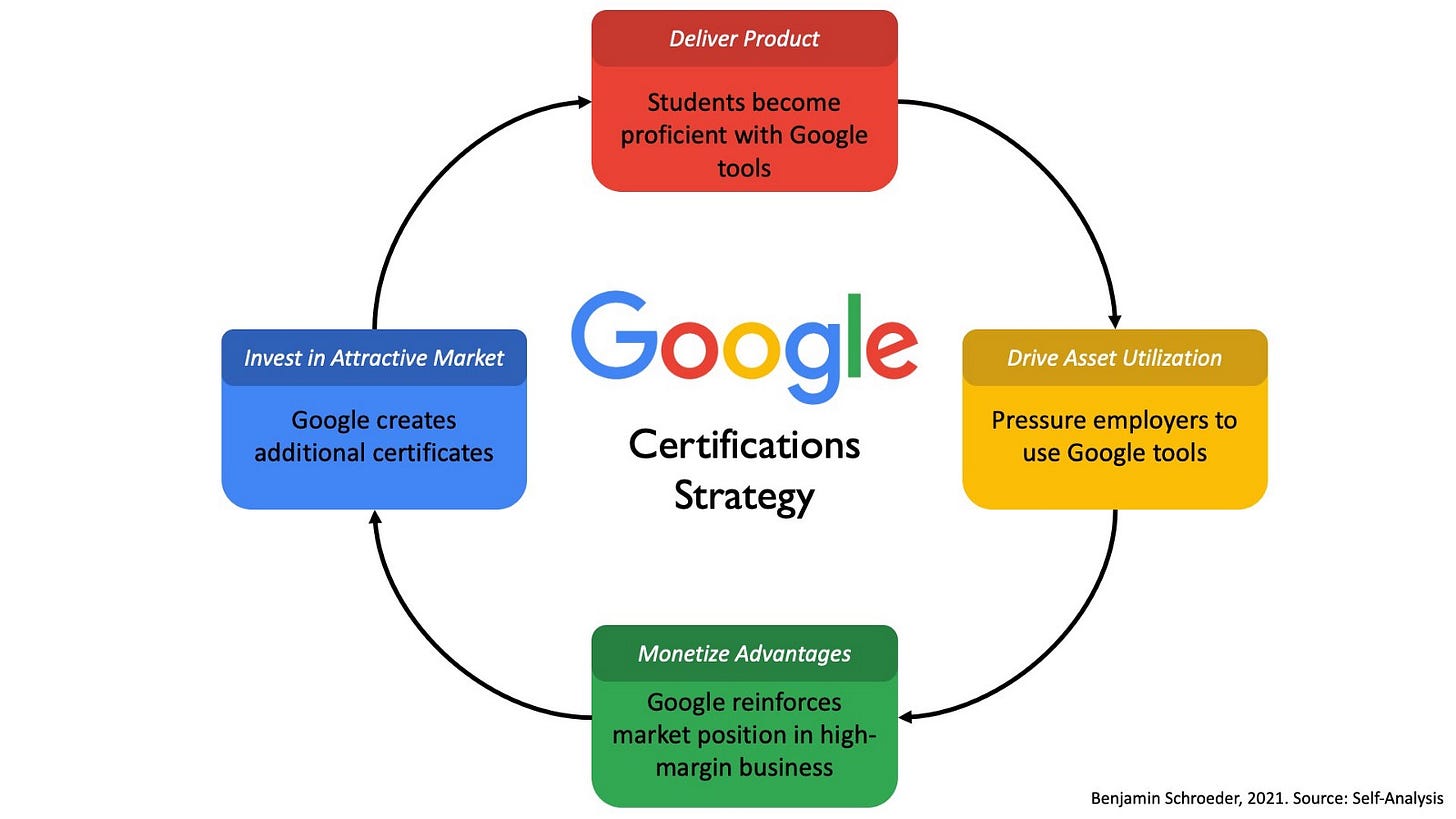The Genius Strategy Behind Google’s $49/mo College Degree
While Google aims to transform the way look and find information, soon enough we will be learning a new Alphabet™
Google has already changed the way we look and find information. As if that wasn’t enough, Google’s new venture, Google Certificates, is aiming to change the way we learn.
Google is launching $49/mo Courses to Replace College Degrees
The company has recently introduced professional certificates which aim to prepare you for careers in IT. So far, only an IT support certificate is available but additional certifications in data analytics, project management and UX design will be released in March. All are priced at $49/mo and take, on average, 6 months to complete.
In an interesting turn of events, Kent Walker (the SVP of Global Affairs at Google) announced that their new career certificates will be treated equally to four-year degrees. A number of other companies have already stated they would also accept Google’s certificates.
“In our own hiring, we will now treat these new career certificates as the equivalent of a four-year degree for related roles” — Kent Walker
It is clear that Google and other companies are taking these certificates seriously. But how did a 6-month certificate come to replace a 4-year degree?
Higher Education is Prone for Disruption

Higher education has been ripe for disruption for more than a decade: tuition has skyrocketed (far outpacing inflation), acceptance rates are dropping and student debt in 2020 was at a record $1.6T. It’s become harder and more expensive to receive a university degree.
Additionally, the COVID-19 pandemic has made people question why they are paying full tuition for glorified YouTube videos. Without face-to-face teaching, extracurriculars or access to facilities, it is hard for universities to justify asking for full-tuition. Remote teaching has also allowed parents to peek in to what a university class looks like, and many have been displeased.
At the same time, the very value of a traditional, 4-year university degree is dropping. According to 2020 data by the Strada Education Network, 59% of aspiring adult learners believe a university degree to be worth the cost, down from 77% in 2019 and 64% of those surveyed believe it will help them get a good job, down from 89% in 2019.
The Value of a Degree Drops Even More in I.T.
Whether you need a university degree to work in the I.T. sector has been a long-standing debate. Looking at data however, the value of a university within the I.T. seems to drop even more. An analysis of Stack Overflow’s 2016 survey found that 56% of developers do not have a college degree in computer science or related fields.
In fact, Nick Larsen, the principal data engineer at Stack Overflow, found that schooling was not the most important factor for employers.
A portfolio of projects and products you have made credible contributions to is worth more than years of experience or schooling — Nick Larsen
Similarly, almost half of the jobs posted on Stack Overflow do not mention a degree at all.
Of 2,287 jobs listed in the U.S., […] 48%, do not specify a “degree” or a “bachelor’s” as one of the requirements, and 52% of U.S. jobs list a degree somewhere in the job posting, either as a requirement or as a preference. — Stack Overflow
With tuition rising, acceptance rates dropping and the very value of the degree dropping, there is clearly a gap in the market in professional skill development — which Google has identified. But why venture into unfamiliar territory?
Why is Google Moving to Online Education?
The Pressure on Google to Grow
While Google remains a tremendously profitable company who has outperformed the S&P 500, their revenue growth over the last 3 years has slowed. In 2017–2018, their revenue grew by 24%, compared to 18% and 13% in 2018–2019 and 2019–2020, respectively.
As countries begin implementing new taxes and measures to capture a portion of the wealth being generated by FAANG, Google cannot rely on its advertising arm as it has in the past. It is being pressured to grow into new verticals.
However, there are not many directions for Google to grow. Generally speaking, when discussing growth strategies there are 3 “main” strategies well-established companies pursue: diversification, horizontal or vertical growth (in reality, it’s often a combination of all).
Google having already depleted all available opportunities to grow horizontally and vertically, it must diversify.
In terms of horizontal growth, Google has expanded into nearly all possible geographies and its project to settle itself in emerging markets, Project Loon, failed. There are few economies of scale or network effects it can continue to pursue.
In terms of vertical growth, Google controls the entirety of the online-advertising supply chain. Not only does the Google search engine control 92% of all online searches, but it also owns the platform which distributes the ads to those platforms. Google could not go more vertical.
Where does that leave us? Diversification
Google’s Growth Strategy: Diversification
Google has long been known for its efforts at diversifying. Since its inception in 1998, Google has killed more than 225 projects: 36 apps, 170 services and 19 hardware projects (Killed by Google), without even mentioning all of the projects that immediately failed, have worked or have yet to be killed by Google.
While there may have been a lot of failures along the way, you only need one idea to work. And I believe that Google’s Certificates are going to work. Why?
Because the $580 Billion U.S. higher education market has been ripe for disruption for over a decade. It just needed the right company to pull it off.
Whenever a company chooses to grow its enterprise value, it’s important to asses whether the growth is “good growth”, i.e. whether the “whole” is worth more than the sum of its constituent parts.
Certificates are Good Growth for Google
Strategically speaking, most “good growth” fulfills at least 2 of the following 4 objectives:
Deepening or defending a firm’s advantage
Driving asset utilization and improving operating metrics
Enabling the firm to additionally monetize advantage
Investment in an attractive market
Google’s certificates is a great example of good growth for 3 reasons. Firstly, it’s investing in a market that is attractive (if disrupted). There is tremendous opportunity to capitalize on higher education’s inelasticity if done right. Secondly, Google will see higher asset utilization and in the long-run improve their operating metrics as a result of more people knowing how to use their suite of products. With more people using their suite of products, Google will be able to monetize additional advantages.
Because Google is able fulfill 3 of the aforementioned objectives, the certificates can be considered as “good growth” and warrant investment by Google.
Google’s Strategy Behind Certifications can be Broken Down into 4 Steps:
1. Invest in an Attractive Market
While the higher education market may not be particularly attractive as it is, Google’s opportunity to disrupt it and leverage synergies in coordination (R&D, software production, distribution, etc.) will give them an enormous advantage over the historically inelastic universities.
In addition to this, because the Google search engine sees 91% of all searches and the Chrome browser has a 63.6% market share, Google can boost signups to their certifications by putting a link directly on google.com and/or by placing links to the certifications ahead of over search results.
2. Deliver the Product
Delivering the product and ensuring customers are satisfied with the product is naturally an important piece of this model. To Google’s advantage however, the risk and upfront cost is rather minimal: with only 1 course available, Google can test the concept with just the IT Support course. Should it prove a success, the company can then focus on developing more courses.
The certifications would also generate over $202+ million in revenue in the first year alone.
Assuming 500,000 customers sign up in the 1st month (as of 02/19, 745,675 are already enrolled)Assuming average customer is subscribed for 6 months (avg. length of 1 course according to Google)Assuming a 5% monthly growth rate=> Revenue in first year = $202,356,2103. Drive Asset Utilization and Improve Operating Metrics
By being in complete control of what the students are learning, Google can focus exclusively on familiarizing students with Google tools (Google Search, Google Drive, Google AdSense, etc.). Having learned their skills on google products, these students will then be able to exert pressure on their employer to adapt and use Google’s tools, if they haven’t done so already.
This will drive asset utilization, improve operating metrics and generate more data for Google. Ultimately, these factors will enable them to continue to ameliorate their product offerings as they collect more data on how companies and individuals leverage their eco-system.
4. Monetize Additional Advantages
Google is playing the long game. The revenue generated from the $49/mo price-tag is not the only revenue source they will be able to leverage. On the contrary, Google will also be able to monetize their suite of other products to new B2B customers.
As companies look to adopt the Google Suite, Google will be able to charge companies for data-storage, cloud processing, and more — which are all highly scalable, high-margin products with monopolistic advantages from network effects. I believe their certifications are part of a long-term plan for Google to grow their B2B business.
Why Google Will Beat Its Competitors
Google is not the only company trying to disrupt education. Coursera (which Google uses), EdX, Udemy and Harvard Online Courses are just a few of the numerous companies looking to disrupt higher education by moving online.
However, Google has a number of advantages over its competitors. For one, Google has an incredibly strong brand-name (especially within the IT sector). As the 3rd most-trusted-brand in the US, they will be able to garner the attention of students who may otherwise be sceptical of other, lesser-known online offerings.
Secondly, Google owns the most popular search engine as well the as the most popular internet browser. This means that they will be able to promote their offerings over those of others (which they’ve been guilty of in the past) or they can direct links to their courses on people’s Google page. This gives them the ability to easily increase the amount of traffic that lands on their site, driving a higher conversion rate.
Lastly, their most important advantage is not that they may get more people to sign-up to the courses — it’s that they will be able to increase the lifetime value of each student to a multiple of that of their competitors. Their certificates will enable them to will be able to monetize their other products as a result of students completing their certificates. No other company can compete on such scale. Google has followed a very similar strategy to that of Disney and competing movie studios.
While Google aims to transform the way look and find information, soon enough we will be learning a new Alphabet™.
If you enjoy my work, why not buy me a coffee ? This newsletter is not monetized, so any donation helps me write, stay motivated, and shows that you truly found my article insightful.




